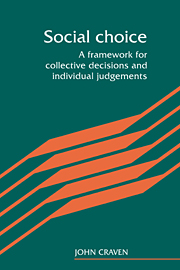9 - Utilitarian judgements
Published online by Cambridge University Press: 15 September 2009
Summary
To those brought up in the traditions of moral philosophy, or indeed of practical welfare economics, it may seem strange that we have yet to discuss utilitarianism. The idea that we translate ‘the greatest good of the greatest number’ into the maximisation of the sum of individuals' utilities is of long-standing and deep significance in moral philosophy. Many theorems in welfare economics are based on the maximisation of ‘social utility’ – but utilitarianism expressed in this way is an uncomfortable doctrine for many social choice theorists because it requires both that we can measure individuals' utilities in some meaningful way, and that we can compare one person's utility with another's so that, having compared them, we can add them together. In the jargon, the standard utilitarian argument requires both measurability and comparability.
In chapter 2 we noted that we could use utility statements to replace those involving preference and indifference: instead of saying that i prefers a to b, we could say that i gets more utility from a than he gets from b. We did not do this partly because talking of the utility of an alternative leads to potential misunderstandings. When all we know is an individual's order of preference, we must not be misled into thinking that there is any greater significance in the extent by which the utility of a exceeds that of b: the statement that ‘i gets twice as much utility from a as from b’ has no more meaning than ‘i prefers a to b’.
- Type
- Chapter
- Information
- Social ChoiceA Framework for Collective Decisions and Individual Judgements, pp. 133 - 144Publisher: Cambridge University PressPrint publication year: 1992



